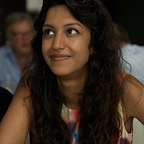Impactful Ideas September: Slowing down for sustainability
Over the last couple of months we’ve noticed a change in pace, a collective slowing down as many of us have taken much needed staycations and vacations over the summer months to relax & reset. The Impactful team have surfed, had an at home festival, seen friends for the first time in months, been out in nature and nurtured our side projects, and we’re feeling refreshed and excited to bring our renewed energy back to Impactful.
The pausing and breathing out have allowed for some time for reflection and, for us, diving deeper into our mission, so we thought we’d focus this edition of Impactful Ideas on slowing down for sustainability. Taking the time to go slower, explore more deeply and build new roots of understanding as we do the important work of creating more positive impact.
Laying the foundations
Part of our life at Impactful is to read and absorb everything we can find about impact through business. We read reports, watch webinars, have conversations with experts, research best practice, all so that we can draw out the key ideas and make them accessible for you.
We stumbled upon the concept of digital gardening, how to turn all of that input into useful output/understanding/new ideas and it inspired us to think about how we manage and share resources with you. We’ll be developing our digital garden of impact resources over the coming months, so watch this space and get in touch if you’d like us to dig into a particular impact area.
Two other brilliant resources to help you personally get the most out of what you’re working on:
Learning how to learn MOOC by Barbara Oakley — An invaluable free course in the science of effective learning in any field, based on leading neuroscience research and led by Barbara Oakley PHD. This course is essential if you want to build expertise, unlock your creativity and use your time effectively.
Year Compass — Slowing down has given us the time to step back and think about what is important and set goals & intentions for months to come. The Year Compass provides a flexible framework to reflect at any time of the year. Take an afternoon to do this now, or plan to do it in preparation for 2021. Having done it a couple of weeks ago, I can assure you, you won’t regret it.
Possible futures
We need to understand the futures available to us and imagine ourselves within the one we most want, whilst actively avoiding the ones we don’t. Sometimes that required us to slow down, take a step back and get a clearer picture of things as they are now and the futures we could be hurtling towards. Here are a few things that have helped us get a glimpse of the possible worlds available to us.
The social dilemma /Extinction: The Facts documentaries — both alarming & sobering about the state of reality with our addictive relationship with social media (told by the tech folks who build the platforms) & our catastrophic impact on the biodiversity on our planet respectively. A reminder of the worlds we’re heading towards if we don’t change course rapidly.
The report from the first citizen’s Climate Assembly — the 100+ representatives met over 6 weekends to discuss and propose ideas for how the UK could achieve net zero emissions by 2050. The recommendations are thoughtful and inspiring. Key principles included educating everyone, fairness, leadership by government and protecting & restoring the natural world. The report talks about how we could go about achieving our emissions ambitions across every part of our lives. We’re looking forward to seeing what happens with the recommendations.
Jon Richardson & the Futurenaughts podcast — futurist Mark Stevenson, co-founder of Futerra Ed Gillespie & comedien Jon Richardson dissect the future of everything from work, education, travel, health care & more with a perfect balance of humour, curiosity & insight.
Imperative21 — we’re following this business led, network of coalitions (including big hitters like B Lab, Conscious Capitalism & CECP), as they come together to reimagine our economic systems for shared prosperity. Join the network, share their beautiful artwork (by Bee Harris, LMNOPI & more) and contact Laura Boyle to collaborate/partner with the project.
And some great articles that caught our eye:
The Pandemic Is Wreaking Havoc On Fossil Fuels by Angus Hervey from Future Crunch
The robot revolution has arrived by David Berrby in National Geographic
The responsible tech movement is held back because we don’t know what to call it by Sarah Drinkwater
Statistics, lies and the virus: Tim Harford’s five lessons from a pandemic in the FT (may be behind a paywall)
We’ll leave you with this passage from one of the latest Future Crunch newsletters:
‘Remember, there’s always more than one future. In the hands of the technology man-children, who are now even richer than last century’s robber barons, the future has been displaced into an opioid of fantasy, colonised by people who want you to pay a subscription for an app that helps you sleep. It’s being sold to us, everywhere, in a never-ending stream of gentle curves and softly glowing pastels, as if it were real, but it’s not.
Don’t buy it. There are wilder, grittier, kinder futures possible, ones that promise something that has never been before. We’re still in the middle of this rupture and there are many hard days still ahead, but there’s also something glinting on the horizon that wasn’t there before. It’s unknowable, strange and different, but that’s our fantasy. Don’t settle for theirs.’
We couldn’t have said it better ourselves. That’s all from us this month. Sign up to get our resources direct to your inbox, follow us on twitter or drop us a line if you’d like to chat at hello@impactful.world. Until next time!
